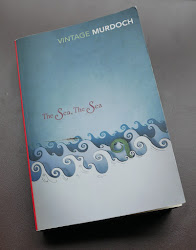I've just finished reading Iris Murdoch's novel, The Sea, The Sea. Ageing actor and director, Charles Arrowby, decides to retire from the limelight. He buys a house, Shruff End, in a remote spot on the coast of the North of England. It's a strange, dilapidated place with no electricity. The sea, only a short walk from the house, looms large.
He seeks solitude: among other things, to write his memoirs (the text of which becomes the book). However, his old friends, uninvited, seek him out. Not only that, but he discovers that his first sweetheart, now old, like himself, lives in a nearby village. She and her husband have bought a bungalow there.
Arrowby, though charming, is a controlling, manipulative monster. He gives a disarmingly honest account of his doings. He seems not to realize how unacceptable and out of the ordinary his behaviour is. The seeds, though, are there for the rest of us to see. Talking of his love for his father, he says 'if you long and long for someone's company you love them' – a remark that might be innocuous when seen in some contexts, but which turns out to be revealing in the context of this man.
Again and again, as the story unfolds, he describes the controlling, abusive behaviour of others while seeming blind to his own. Having been a famous theatre director, he seems to think he can direct the lives of real human beings the way he directed actors. He thinks of himself as the magician, Prospero. The whole book, in fact, has the feel of a Shakespeare play. It helps that many of the characters – Arrowby's old friends – are actors. The way the house itself and the sea let us know how the balance of the universe (and Arrowby's mind) have been disturbed has a Shakespearean feel to it, too.
As the book goes on, it becomes clear that the man who thinks he's a magician is no more than a bully, incapable of foreseeing, understanding or caring about the effect of his actions on the emotional life of others. The real magician in the book is his cousin, James, a (retired?) soldier and Buddhist. To explain much more would be to give too much away, although at one point, Arrowby asks James about a man he'd once seen at his London flat:
'Oh him,' said James, 'he was just a tulpa.'
'Some sort of inferior tribesman I suppose! And talking of tulpas, what about that Sherpa that Toby Ellsmere said you were so keen on? The one who died on the mountain?'
James doesn't pick up and correct his cousin's facile assumption. (Incidentally, it's not the only time Arrowby's racism breaks through). If he had, he would have explained that in Buddhism, a tulpa is 'a magical creature that attains corporeal reality, having been originally merely imaginary'. It can also be defined as 'a type of thoughtform capable of independent action, with a persistent personality and identity; a kind of modern imaginary friend.' (Wiktionary). The idea has disturbing similarities to the way Arrowby thinks about Hartley. That he is cheerfully oblivious to the real meaning of the word is an irony that reverberates through the book Iris Murdoch would have us believe he's written.
The Sea, the Sea won the Booker Prize for Murdoch in 1978. Has it aged well? I'd say so. I first read it back in the 1980s. Re-reading it now, it's still an enthralling read.


I never heard of this book, but it sounds like something I would be interested in. It also reminds me of a story. A true one. In our community, there is a doctor. I like him well enough. He's plain spoken and even rude, but I guess that being a plain spoken person myself, I tend to go easy on those with the same shortcoming (I do hope I am not rude though). But I digress. When he moved here to take a job at our hospital, he met another doctor's wife. He became smitten with her, and began to publically persue her, even though she was (at the time) happily married and a mother. He actually courted her, expensive gifts and flowers and it caused quite a scandal. After several years, she did leave her husband, and now they are married. I cannot imagine such a thing, but hearing about it has forever changed how I look at this doctor.
ReplyDeleteSays a lot for the book that it sparks resonances like that with real life. Given what you say, you'd probably find it an intriguing read!
DeleteSounds interesting, I shall look out for it.
ReplyDeleteIt is! For me, it's one of those books that stays with you.
Delete